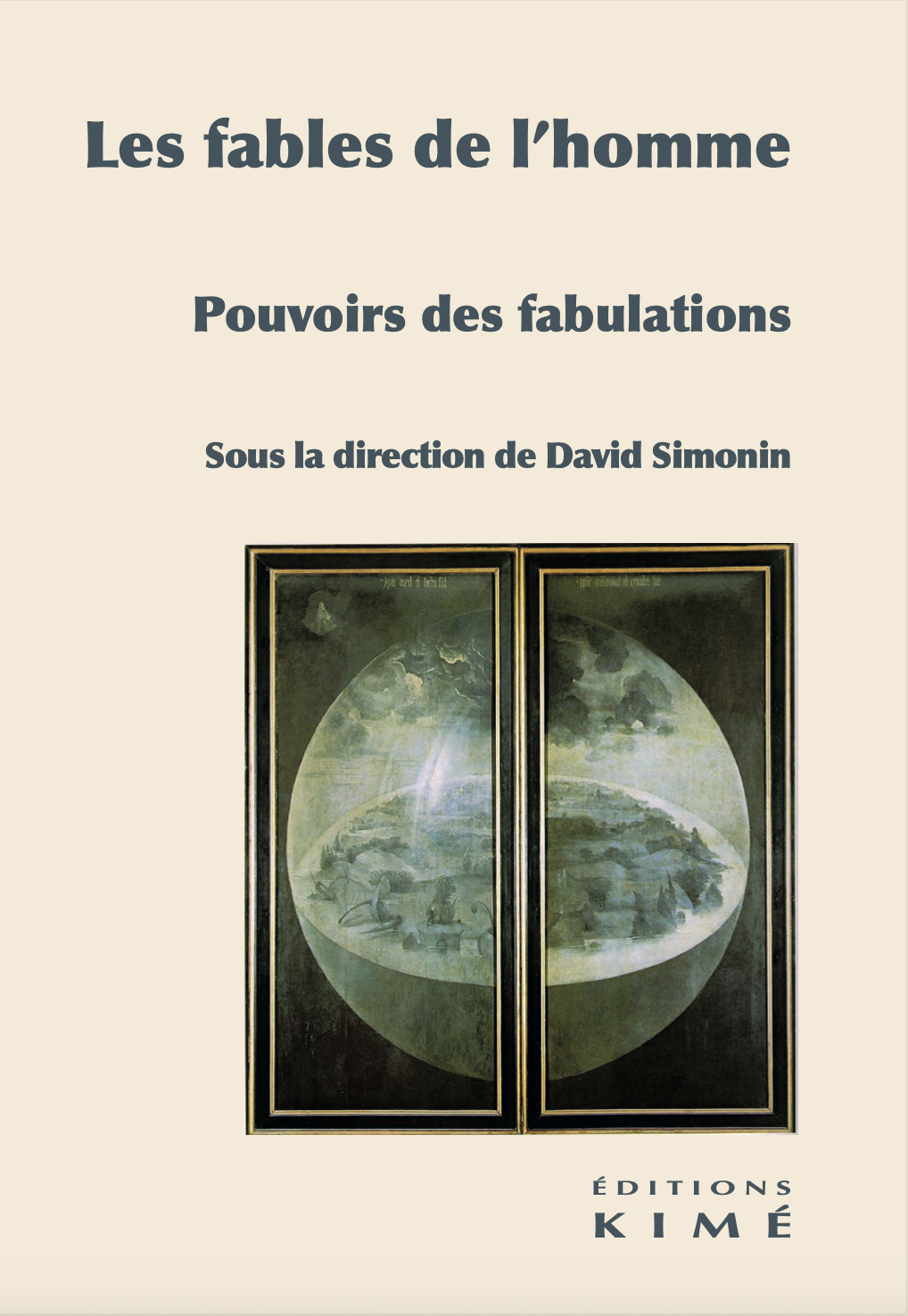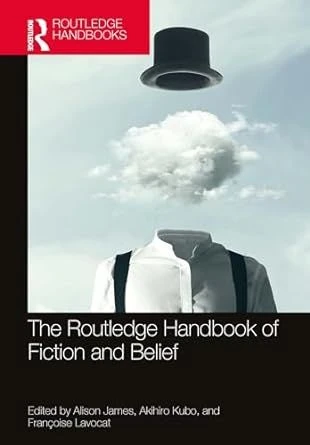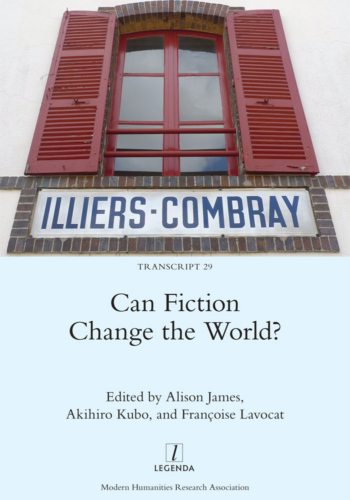Publication : Les Fables de l'homme. Pouvoirs des fabulations
David Simonin (dir.)
Par Anne BESSON le 25 novembre 2025

Les Fables de l'homme. Pouvoirs des fabulations, Kimé, 2025.
Et si nos illusions façonnaient le réel plus
sûrement que la vérité ? À l’ère des fake news, de la
post-vérité et des réalités virtuelles, il ne fait plus de doute
que les croyances fausses, les fictions et les illusions ont un impact profond
sur nos sociétés. Ce qui fut longtemps perçu comme une déviation à corriger
apparaît désormais comme une constante de la pensée et du
comportement humains.
Cet ouvrage collectif propose une exploration inédite de cette
puissance de la fabulation : pourquoi avons-nous besoin de nous
raconter des histoires, individuellement et collectivement ? Quels sont
les effets de ces récits et de ces représentations ?
Croisant philosophie, littérature, sciences humaines et sociales, les auteurs
interrogent les fondements de notre rapport à la réalité. Ce livre
esquisse ainsi l’archéologie d’un régime de savoir aujourd’hui
prégnant, dans lequel l’illusion, loin d’être toujours l’opposé de la
vérité, en devient une force structurante avec laquelle il faut composer.
David Simonin, Introduction : les
pouvoirs des fabulations
Première Partie
Fonctions de la Fiction
1. Françoise Lavocat, Femina Fabulatrix
2. Gerson Reuter, La
compréhension de soi à travers les fictions
3. Valérie Stiénon, La dystopie comme fiction
d’alerte : une approche du récit proactif
Deuxième Partie
Réécrire l’histoire
4. Johann Chapoutot, L’historien et le sens
5. Eva Schürmann, Qu’est-ce qui distingue
l’historiographie de l’art du roman ?
Troisième Partie
Approches psychologiques de l’activité
fabulatrice
6. Guido Baggio, Les contours de la
cognition : Le vague et les croyances dans Les
Principes de psychologie de William James
7. Lisa Bortolotti, Matteo Mameli et Kathleen
Murphy-Hollies, Le Renard et le Hibou : confabulation, conspirations et
régulation de soi
Quatrième Partie
Imaginaire social et fabulations
juridico-politiques
8. Molly Andrews, Connaissance, croyance et
incrédulité
9. Hans Kelsen, Le concept juridique et le
concept sociologique de l’État. Examen critique du rapport entre
l’État et le droit, § 33-35 (introduit et traduit par Christophe Bouriau)
10. Manuel Rebuschi, Le robot, personne ou
personnage ?
Cinquième Partie
Récits et mises en scène de soi
11. David Simonin, Le bovarysme :
manières de fabuler
12. Nathalie Luca, Filmer. Être filmé. Une
mise en scène collaborative performative
13. Anna Caterina Dalmasso, Archéologie du
selfie. Miroirs et autres fictions du soi
Publication : Alison James, Akihiro Kubo, Françoise Lavocat (dir.), The Routledge Handbook of Fiction and Belief
Londres, Routledge, 2023
Par Anne BESSON le 15 octobre 2024

The Routledge Handbook of Fiction and Belief offers a fresh reevaluation of the relationship between fiction and belief, surveying key debates and perspectives from a range of disciplines including narrative and cultural studies, science, religion, and politics. This volume draws on global, cutting edge research and theory to investigate the historically variable understandings of fictionality, and allows readers to grasp the role of fictions in our understanding of the world.
This interdisciplinary approach provides a thorough introduction to the fundamental themes of:
Theoretical and Philosophical Perspectives on Fiction
Fiction, Fact, and Science
Social Effects and Uses of Fiction
Fiction and Politics
Fiction and Religion
Questioning how fictions in fact shape, mediate or distort our beliefs about the real world, essays in this volume outline the state of theoretical debates from the perspectives of literary theory, philosophy, sociology, religious studies, history, and the cognitive sciences. It aims to take stock of the real or supposed effects that fiction has on the world, and to offer a wide-reaching reflection on the implications of belief in fictions in the so-called “post-truth” era
Contents
Introduction
Alison James, Akihiro Kubo, and Françoise Lavocat
Part I: Believing in Fiction: Philosophical and Theoretical Perspectives
Belief, Imagination, and the Nature of Fiction
Stacie Friend
The "Willing Suspension of Disbelief": The Long History of a Short Phrase
Nicholas Paige
The Fictionality of Games and the Ludic Nature of Fiction: Make-believe, Immersion, Play
Marie-Laure Ryan
Fictional Emotions and Belief
Eva-Maria Konrad
Fictional Characters and Belief
Thomas Pavel
Fictionality, the Zone of Generic Fiction, and the Allure of Unreliable Narration
James Phelan
Belief is a Mess. That Makes it Good for Fiction. (A Perspective from Cognitive Literary Theory)
Lisa Zunshine
Fiction and Historiography
Annick Louis
Fiction and Scientific Knowledge
Adam Toon
Learning from Fiction
Gregory Currie, Heather Ferguson, Jacopo Frascaroli, Stacie Friend, Kayleigh Green, and Lena Wimmer
Part II: From Fiction to Belief: Social and Political Effects
Do Fictions Impact People’s Beliefs? A Critical View
Nicolas Baumard and Edgar Dubourg
The Impact of Fiction on Beliefs about Gender
Vera Nünning
Implicit Bias, Fiction, and Belief
Kris Goffin and Agnes Moors
Children’s Ideas about Stories and about Reality
Ayse Payir and Paul L. Harris
From Suspension of Disbelief to Production of Belief: The Case of Alternate Reality Games
Patrick Jagoda
Interactive Environments and Fictional Engagement
Olivier Caïra
Fake News and Fictional News
Jessica Pepp, Rachel Sterken and Eliot Michaelson
Trust, Credulity, and Speech
Philippe Roussin
Literature on Credit: Fiction and the Fiduciary Paradigm
Emmanuel Bouju
Fifth Generation Fictionality? Fiction, Politics, War
Henrik Zetterberg-Nielsen
Uses of Fantasy Fiction in Contemporary Political Mobilization
Anne Besson
Fiction, Belief, and Postcolonial Criticism
Alok Yadav
Can Fictions Predict the Future?
Anne Duprat
Dystopian Fictions and Contemporary Fears
Jean-Paul Engélibert
Fiction, Belief, and Climate Change: Paratexts, Skeptics, and Objects of Care
Erin James
Part III: Fiction and Religious Belief
Greek Mythology: Discourse, Belief, and Ritual Action
Claude Calame
Fiction and Belief: Approaching Medieval Latin Christendom
Julie Orlemanski
Literary Fictions, Religious "Fables," and Unbelief in the West
Nicolas Correard
Saints, Between Faith, Belief, and Fiction
Barbara Selmeci Castioni
The Role of Fiction in Buddhist Hagiography: The Case of Shinran
Markus Rüsch
Fiction and Belief in Ancient and Early Medieval India
Isabelle Ratié
Fiction, Religion, and Pre-Modern Arab-Islamic Literature (8th–18th Centuries)
Aboubakr Chraïbi
Fiction against Belief and Belief in Fiction in Modern Arabic Literature
Ève de Dampierre-Noiray
On Jewish Fiction and Belief: Duplicity, Parables, Confession
Sarah Hammerschlag
Religious Uses of Fantasy Fiction
Markus Altena Davidsen
Fake Cults, Hyper-Real Religions, Virtual Beliefs at the Crossroads of Fiction, the Sacred, and Technology
Lionel Obadia
—
Alison James is Professor of French at the University of Chicago. Her research interests include the Oulipo group, the contemporary novel, theories and representations of everyday life, documentary literature, and questions of fact and fiction.
Akihiro Kubo is Professor of French Literature at Kwansei Gakuin University. His research interests focus on twentieth-century French literature and theories of literature.
Françoise Lavocat is Professor of Comparative Literature at the Université Sorbonne Nouvelle. She received an honorary doctorate in Humane Letters from the University of Chicago, and is a member of the Institut Universitaire de France as well as a member and section chair in the Academia Europaea.
Parution : Fictionality, Factuality, and Reflexivity Across Discourses and Media
Par ADMIN SIRFF/ASIFF le 17 juin 2024

Concerned with the nature of the medium and the borders between fact and fiction, reflexivity was a ubiquitous feature of modernist and postmodernist literature and film. While in the wake of the post-postmodern “return to the real” cultural criticism has little time for discussions of reflexivity, it remains a key topic in narratology, as does fictionality. The latter is commonly defined opposition to the real and the factual, but remains conditioned by historical, cultural, discursive, and medium-related factors. Reflexivity blurs the boundaries between fact and fiction, however, by giving fiction a factual edge or by questioning the limits of factuality in non-fictional discourses. Fictionality, factuality, and reflexivity thus constitute a complex triangle of concepts, yet they are rarely considered together. This volume fills this gap by exploring the intricacies of their interactions and interdependence in philosophy, literature, film, and digital media, providing insights into a broad range of their manifestations from the ancient times to today, from East Asia through Europe to the Americas.
- In collaboration with: Graham Priest and Richard Saint-Gelais
- Edited by: Erika Fülöp
Volume 75. In the series Narratologiahttps://doi.org/10.1515/9783110722031
Publication : Can Fiction change the World ?/ La fiction peut-elle changer le monde ?
Par Anne BESSON le 15 mars 2024
Dirigé par Alison James, Akihiro Kubo, et Françoise Lavocat

La fiction peut-elle changer le monde ? Le fait-elle réellement ? Des délires de Don Quichotte aux rêveries romantiques d'Emma Bovary, la fiction a souvent dépeint ses propres effets en termes négatifs, tandis que les anxiétés contemporaines concernant les jeux vidéo ou les mondes virtuels ravivent les anciennes craintes de la confusion entre fiction et réalité. Au-delà de ces représentations et dénonciations, il existe de nombreuses preuves de l'influence des univers fictionnels sur les vies réelles, les identités et les pratiques sociales. Tirés de cultures et de médias variés, les exemples étudiés ici incluent les fictions politiques du Japon prémoderne, les utilisations de la fiction dans les affaires juridiques et la fanfiction activiste contemporaine. Ils illustrent les effets de la fiction à différentes échelles, des paradoxes de la réponse émotionnelle individuelle à l'action collective à grande échelle.
Alison James est professeure au Département de Langues et Littératures Romanes de l'Université de Chicago, Akihiro Kubo est professeur à l'École des Humanités de l'Université Kwansei Gakuin, et Françoise Lavocat est professeure de Littérature Comparée à l'Université Sorbonne Nouvelle.
TRANSCRIPT 29 – 22 January 2023 • 282pp
 22 January 2023 • 282pp
22 January 2023 • 282pp
ISBN: 978-1-839541-45-2 (hardback) • RRP £85, $115, €99ISBN: 978-1-839541-46-9 (paperback, forthcoming)ISBN: 978-1-839541-47-6 (JSTOR ebook)



 Catégorie :
Catégorie : 